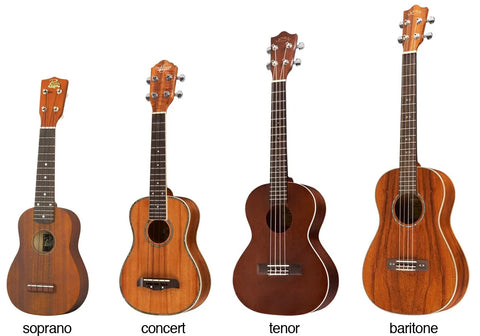Jul 02, 2024
How to Choose the Right Ukulele Size
Choosing the right ukulele size is crucial for comfort, playability, and the sound you desire.
With four main sizes to choose from—soprano, concert, tenor, and baritone—each offers unique qualities suited to different players and styles. This guide will help you understand the differences between these sizes and how to select the best one for your needs.
Soprano Ukulele
Overview: The soprano ukulele is the smallest and most traditional size, known for its bright and cheerful tone. It's the most common size and is often recommended for beginners, especially younger players or those with smaller hands.
Specifications:
- Scale Length: Approximately 13 inches
- Total Length: About 21 inches
- Number of Frets: 12-15
Pros:
- Lightweight and portable
- Traditional ukulele sound
- Ideal for children and beginners
Cons:
- Limited fret space can be challenging for players with larger hands
- Less volume and resonance compared to larger sizes
Best For:
- Beginners
- Players with small hands
- Those seeking a traditional, bright ukulele sound
Concert Ukulele
Overview: The concert ukulele, slightly larger than the soprano, offers a fuller sound and more room on the fretboard. It balances playability and tone, making it a popular choice for both beginners and intermediate players.
Specifications:
- Scale Length: Approximately 15 inches
- Total Length: About 23 inches
- Number of Frets: 15-20
Pros:
- More comfortable for players with larger hands
- Fuller, louder sound
- More frets for extended range
Cons:
- Slightly less portable than the soprano
Best For:
- Beginners and intermediate players
- Those looking for a balance between size and sound
- Players with larger hands
Tenor Ukulele
Overview: The tenor ukulele is larger than the concert and offers a deeper, richer sound with more volume. It's favored by professional musicians and players looking to expand their skills with fingerpicking and more complex techniques.
Specifications:
- Scale Length: Approximately 17 inches
- Total Length: About 26 inches
- Number of Frets: 15-20
Pros:
- Rich, full sound with more volume
- More space on the fretboard for advanced techniques
- Suitable for fingerpicking
Cons:
- Less portable than soprano and concert sizes
Best For:
- Intermediate and advanced players
- Fingerpickers and those seeking a richer tone
- Performers needing more volume
Baritone Ukulele
Overview: The baritone ukulele is the largest size, with a deeper, guitar-like sound. It is tuned differently (D-G-B-E), similar to the top four strings of a guitar, making it a great transition instrument for guitar players.
Specifications:
- Scale Length: Approximately 19 inches
- Total Length: About 30 inches
- Number of Frets: 18-21
Pros:
- Deep, rich sound
- Similar tuning to a guitar, easing transition for guitarists
- More volume and resonance
Cons:
- Not as traditional in sound as other ukulele sizes
- Larger and less portable
Best For:
- Guitar players transitioning to ukulele
- Those seeking a deep, rich tone
- Players who need more volume and resonance
Choosing the Right Size
When selecting the right ukulele size, consider the following factors:
1. Hand Size and Comfort
- Soprano: Best for small hands and children
- Concert: Suitable for most hand sizes
- Tenor: Good for larger hands and advanced techniques
- Baritone: Ideal for guitar players and those with larger hands
2. Desired Sound
- Soprano: Bright and traditional
- Concert: Balanced and versatile
- Tenor: Rich and full
- Baritone: Deep and guitar-like
3. Playing Style
- Soprano: Simple strumming and traditional playing
- Concert: Versatile for strumming and some fingerpicking
- Tenor: Great for fingerpicking and complex techniques
- Baritone: Suitable for fingerpicking and transitioning from guitar
4. Portability
- Soprano: Highly portable
- Concert: Portable with better sound
- Tenor: Less portable but offers richer sound
- Baritone: Least portable, best for stationary playing
Conclusion
Choosing the right ukulele size is a personal decision that depends on your hand size, desired sound, playing style, and portability needs. Whether you prefer the traditional sound of a soprano, the balanced tone of a concert, the rich resonance of a tenor, or the deep, guitar-like qualities of a baritone, there is a ukulele size that will perfectly suit your needs. Explore each size, try them out if possible, and find the ukulele that feels and sounds just right for you.



